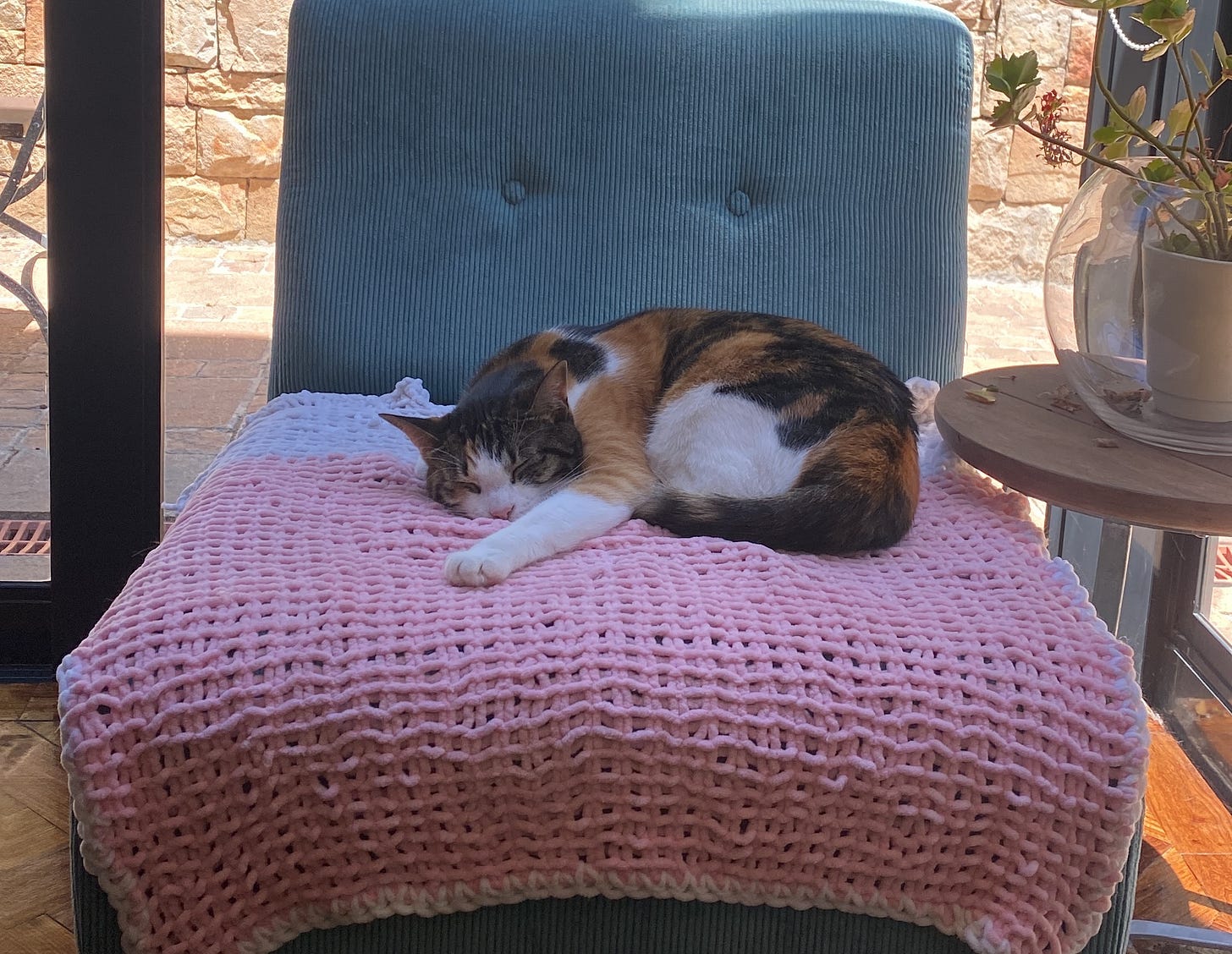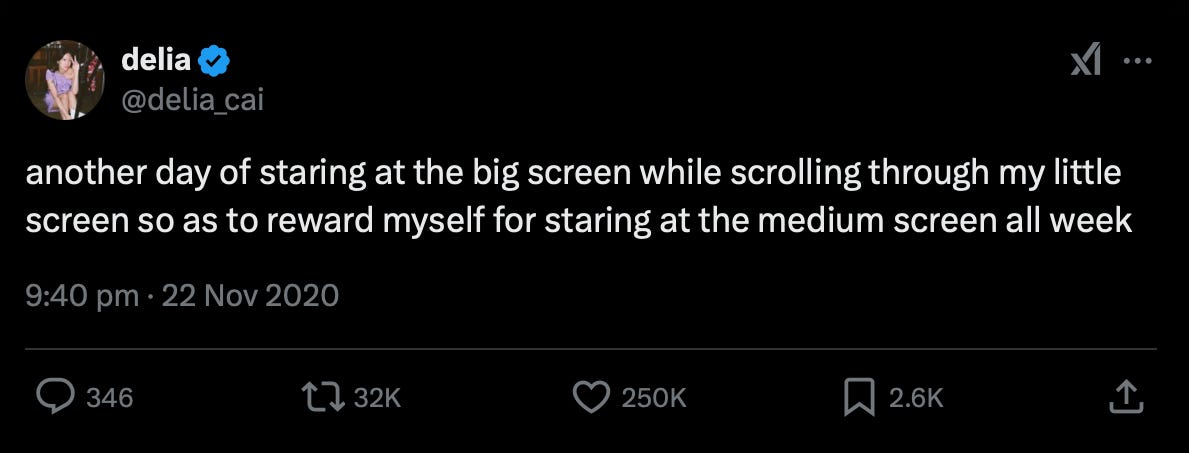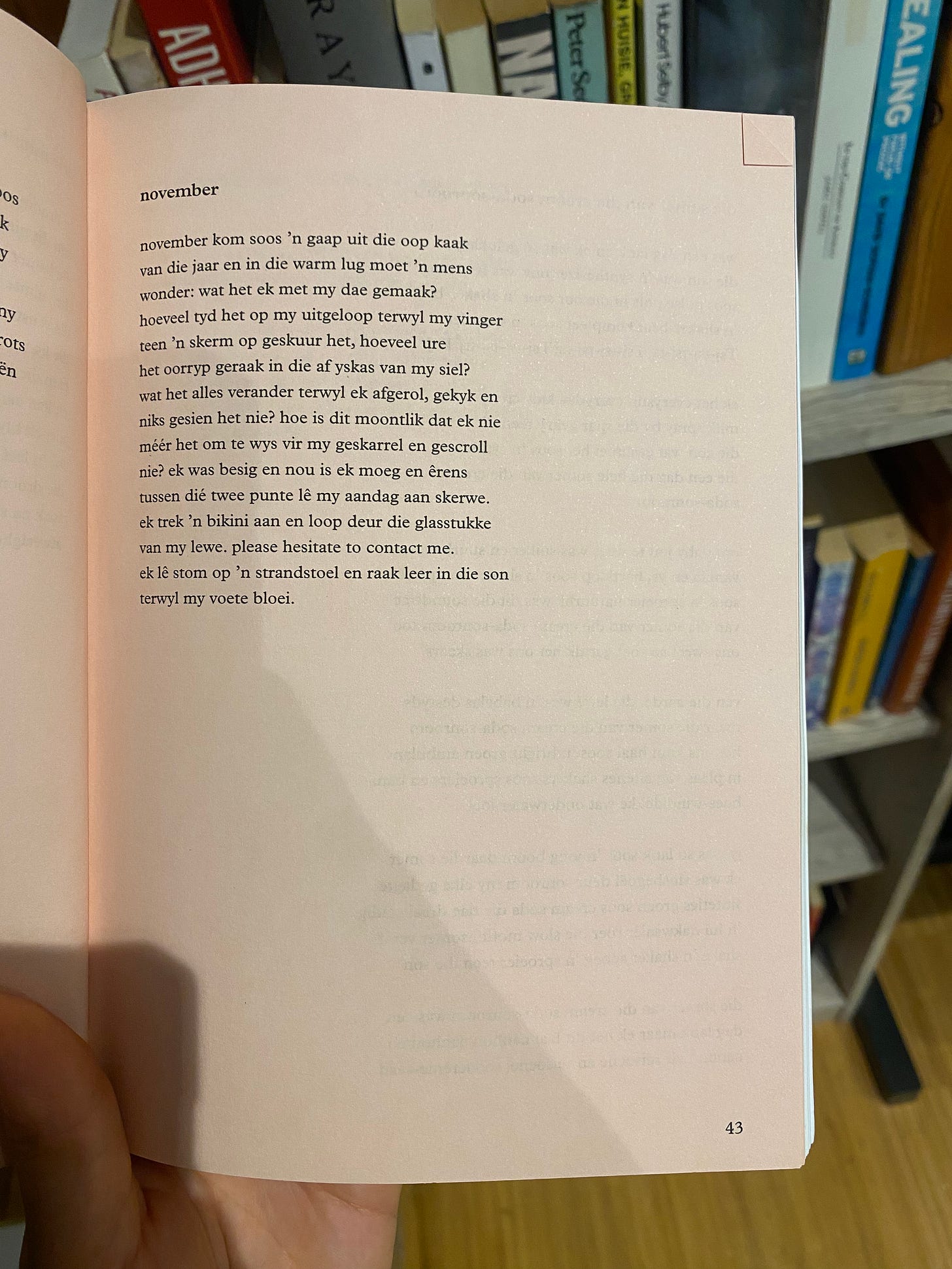Screentime: An Introduction
Preliminary thoughts on screens, intentionality, and a way forward
“She lay every morning under an avalanche of details, blissed, pictures of breakfasts in Patagonia, a girl applying her foundation with a hard-boiled egg, a shiba inu in Japan leaping from paw to paw to greet its owner, ghostly pale women posting pictures of their bruises—the world pressing closer and closer, the spiderweb of human connection grown so thick it was almost a shimmering and solid silk, and the day still not opening to her. What did it mean that she was allowed to see this?”—excerpt from No One is Talking About This by Patricia Lockwood

Scenario: It's nearing midnight and I need to go to sleep. I have spent the last twenty minutes with a book in my hand, shuffling between LinkedIn profiles, Wikipedia entries, and occasional course prospectuses. Last night, I told myself I would read a book with my morning coffee. Having broken that promise upon emerging from my slumber half an hour later than I hoped to, I resolved to push my reading to the opposite edge of the day. Yet, here I am, filling these pre-sleep minutes with half-baked searching before opening a book, reading one page, and setting myself up for the same plan as I turn out the light: a tomorrow-morning in which the need for speed and distraction dissipates, in which I shall wake washed anew with focus and commitment.
I've been thinking about screens—phones, laptops, televisions, otherwise known as small screen, medium screen, and big screen.

In keeping with my tendency to pick up my phone in a time of crisis or curiosity, I've turned to the internet for answers. There is an endless stream of YouTube videos on digital detoxes, social media breaks, hobbies to pick up to combat scrolling, dopamine menus, and challenges in which creators replace their screen time with reading time. Listicles suggest setting screen time limits (done), turning off notifications (done for some platforms), and switching your phone display to greyscale to reduce its appeal (not done, because I find this ridiculous). Other people have opted for "dumbphones", which prompt them to revive their use of iPods, cameras, and other decentralised vehicles for media consumption.
It would be easy, albeit plausible, to chalk this all up to algorithms, the attention economy, and other buzz words that crop up when one seeks quick fixes. Yes, the apps form part of a broader tapestry of Big Tech designed to eat away at your attention and, therefore, wallet. But, in spite of the recent resurgence of these tendencies, I've been able to exercise self-control when it has suited me and refrain from opening Instagram or LinkedIn as much. I am more likely to be sucked into a Googling spiral than I am an Instagram doomscroll on a good day. I deleted YouTube last year and only consume long-form video content on medium and big screen, now. I stopped phoning my dad every time I walked from my car to my lecture venue and began to notice the birdsong on campus. My screen time isn't perfect, but it's not awful.
Ultimately, though, the problem and all its constituent parts can be grouped under two branches—automation and intentionality.
I—we—have been distracted for a long time. As a child, I would fall asleep staring at my Double Wavy lava lamp for an inordinate amount of time or listening to Magic Tree House audiobooks, often reaching the end of a story before nodding off. I watched VH1 whilst drawing, playing a game, or doing work. I read novels whilst half-listening in class. And whilst much of my distraction has been contingent on forms of media specific to my time and place, its history and role in human behaviour predate my personal wanderings and will continue long after I am gone.
That said, I feel that it is important to address distraction and engagement as they are currently characterised in our age—as automated, streamlined processes taking place on platforms over which we, the users, have little control. That said, whilst much of our media consumption has been centralised to certain devices or platforms, the promise of infinite choice is hampered down by licensing agreements, regional restrictions, and [incohesive or non-existent connections] between individual service providers' offerings (see: Dunkey's Guide to Streaming Services).
Many of our tastes are dictated and facilitated by screen-based media. We can't (and shouldn't?) entirely unplug ourselves from the digital world. However, I fear that many people, across age groups and socioeconomic brackets, find increasingly large chunks of their attention drawn to mundanity without realising it. We may outsource some seemingly time-consuming task—making a playlist without machine-assisted discovery, taking the extra time to find a movie that you really want to watch instead of settling for suggested mediocrity—in exchange for our personal taste. One can't even conduct a basic Google Search without churning out an AI summary, a feature from which you can't opt out.
When I first started delving deeper into my day-to-day observations, I was focused on the pitfalls. This stemmed in part from the feeling of dread that overtakes me whenever I notice someone glued to their phone crossing the road, holding their baby, in class, in a queue, filling every second between A and B with something. This dread hasn't subsided, and is also the primary reason I want to stop relying on my phone to fill the lulling seconds and be in the world a bit more than I currently am. But, it has also lead me to think about how much joy I have experienced because of the screen-centred age in which I have grown up. Saturday afternoons spent trawling Gamesgames.com for subpar but wildly entertaining AdobeFlash games. Hours filled with movies and television shows both actively sought-out in DVD shops and passively consumed via DStv. Cute cat videos (cliché but true). Meme-based frames of reference that have outlasted the fleeting ephemera that formed them. Wikipedia—arguably one of the greatest human endeavours to date.
Can we keep these good things and diminish the bad?
Since I started writing this, I have still found myself pulled towards too many pick-ups and too little pay-off. This line of thinking has made me more aware of this fact, though, which is something I want to sustain. I don't want to look back at myself in two, five, ten years and lament the amount of time I sunk into meaningless, short-term engagements that would have been better spent pursuing the same thing—information—on better terms.
I want to reorient myself. I want to write about screens and issues that stem from them—distraction, automation, residual and legacy media, streaming services, social networks, interactivity—without jumping to conclusions or clichés. I want to see whether my aims are possible or mere wishful thinking. I can't hope to speak to anyone else's experience but my own, but I hope that, in writing this, I can reach into the middle of can't-live-with-them and can't-live-without-them in order to pull out some kind of solution.




Thoughts on crafting (sewing/knitting/crocheting/other art/etc.) while listening to music or watching a small to large sized screen?
I feel music is passive enough and still allows you to (hyper)focus and be intentional in your craft. But sometimes a simultaneous screen or podcast can be fun but very definitely distracts. I struggle to focus on my task while listening to something but still have that intrinsic "addict-like" need to put something on when I start. And more and more frequently, consciously choosing to complete a task without an extra screen/earphone has lead to much more peaceful and enjoyable afternoons. It is getting past that first impulse which is so hard.
Thank you for a lovely article! It is going to help me try commit to being more intentional with the small screen.
Niamh, thank you for this fantastic reflection on the role of screens in our lives. I love that you brought in DVD stores — my heart aches a little at the memories.
When it comes to intentionality, I can chalk up at least one win. I've rewired my brain so I absolutely cannot do anything else when watching a movie. Not scrolling or sketching or anything remotely "useful" in getting anything done outside of appreciating the work in front of me.
That said, it is the ONLY space where I can claim that attentiveness. LinkedIn searches commingled with single-page reading marathons? I'm right there with you.
As someone who constantly drowns out the silence with a novel or sketchbook, it's nice to be reminded to listen to the birdsong and crash of the waves a little more closely and learn to appreciate the silence between moments.